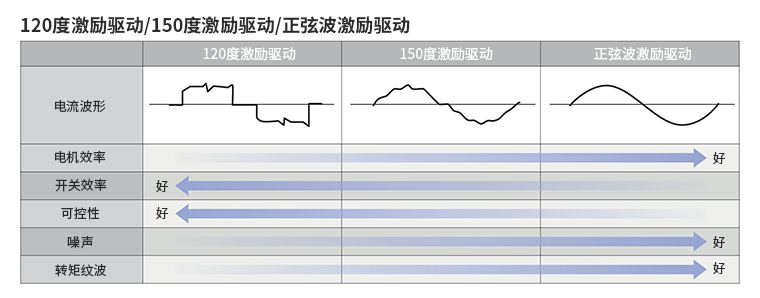Introduction to Conduction Angle and Characteristics of Three Phase Brushless DC Motor Driver
Time:2023-10-13
Views:623
ROHM has over 220 models of motor driver ICs and has a strong market performance. The motors covered by motor driver ICs include brushless DC motors, stepper motors, single-phase brushless DC motors, and three-phase brushless DC motors (including high voltage). Motor driver ICs have a variety of voltage, current, and packaging product lineups with high efficiency and reliability, as well as pin compatible motor driver ICs.



There are over 20 models of three-phase brushless DC motor driver ICs. In addition to products with conduction angles of 120 degrees and 150 degrees, three-phase brushless DC motor driver ICs also have sine wave (180 degrees) excitation driving methods that achieve low noise and low vibration, 3 Hall and 1 Hall sensor types, sensorless types, pre driver types, and other products. The product lineup of three-phase brushless DC motor driver ICs is very rich.
Conduction angle and characteristics of three-phase brushless DC motor driver
The following table lists the conduction angle and its characteristics of three-phase brushless DC motor drivers.

Simply put, the closer the conduction angle is to the half cycle electrical angle (=180 degrees), the higher the efficiency of the motor. In the above figure, the "sine wave excitation drive" is a 180 degree excitation drive.
On the contrary, the 120 degree excitation drive has the characteristics of high switching efficiency and easy control.
Moreover, as the conduction angle approaches 180 degrees, noise, vibration, and torque ripple are all improved. This can be understood through the characteristics of the conduction angle current waveform.
Characteristics of ROHM three-phase brushless DC motor driver IC
● Driver IC product lineup using sine wave excitation driving method (by sensor type)
The three-phase brushless DC motor driver series includes models using sine wave excitation driving method, suitable for three Hall sensor types and one Hall sensor type product. Regardless of the type of sensor, low noise and low vibration can be achieved by using a sine wave excitation driving method.
The following figure compares the 150 degree excitation drive and sine wave excitation drive of driver IC BD63251MUV. In the left figure, the current waveform of the motor driven by sine wave excitation is smooth, while in the 150 degree excitation drive, distortion of the current waveform is inevitable. The figure on the right shows a relative comparison of noise levels. From the figure, it can be seen that the sine wave excitation drive does not have the same noise spike as the 150 degree excitation drive, and the noise is lower.

●Supports 3 Hall models, 1 Hall model, and sensorless models
In addition to the previous products suitable for three Hall sensor types, there are also products that can reduce the number and space of components suitable for one Hall sensor type and sensorless type in the product lineup. We can provide ideal solutions according to the needs of the application.
●Pre driver+power transistor configuration, supporting a wider driving voltage range
BD63001AMUV and BD63002MUV are pre driver specification motor driver ICs used to drive external MOSFETs. BD63001AMUV can be used under conditions where the VM voltage is higher than the Vcc voltage, and supports a wider driving voltage range. In addition, when used under the condition of Vcc=VM, the logic of driving the UH/VH/WH pins of the external high side transistor can be set through the HLSW pin, thus reducing the number of external components.

Support Information
Click on the following link to access the product lineup of three-phase brushless DC motor driver ICs and the models of three-phase brushless DC motor driver ICs equipped with the aforementioned functions. Regarding the above functions, please refer to the technical specifications for the three-phase brushless DC motor driver IC of each model for details.
When searching for motor driver IC through power supply voltage, please click here.
3.3V/5V (single chip)
12V (single chip)
24V (single chip)
12V (pre driver)
24V (pre driver)
|
Disclaimer: This article is transferred from other platforms and does not represent the views and positions of this site. If there is any infringement or objection, please contact us to delete it. thank you! |











